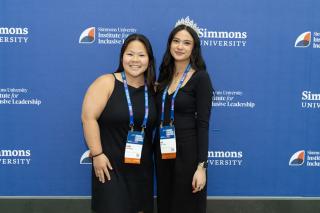In addition to applying classroom skills to the Simmons Leadership Conference, students in “Applied Inclusive Leadership: Project Management for Real-World Impact” (BUS 375), (taught by Kristen Palson, COO of the Simmons University Institute for Inclusive Leadership and Executive Producer of the Simmons Leadership Conference (SLC), and SOM Dean Astrid Sheil exercised improvisation skills to support them in the “Art of the Ask.” We spoke to Palson and student Isa Trello about how this worked.
Students in the Spring 2025 semester session of “Applied Inclusive Leadership: Project Management for Real-World Impact” (BUS 375) learned a unique approach to delivering business requests, and had the opportunity to put their skills into practice.
“The Art of the Ask” is a role-play activity where students prepare a short pitch requesting resources, support, funding, or partnership from an external source. Students were asked to choose a real or realistic leadership scenario connected to their work on the SLC or another professional setting.
“To me, role-playing was a no-brainer,” says Palson, who has a background in theater. "Asking students to not just conceptualize an ‘ask,’ but to really try it, proved to be so powerful. Students walked in thinking they couldn't do it, only to realize these really are skills they can practice, cultivate, and improve."
Improv and Closing the Deal
Individually, students took turns presenting their “asks” and received feedback from peers on their clarity, persuasiveness, and executive presence. Palson played the role of a client hearing student pitches, as did Dean Sheil and guest speaker Sarah Breigle, Vice President of Marketing and Communications for the Institute for Inclusive Leadership.
“It was all improv!” says Palson. “Sometimes I was a nice client, sometimes I was a difficult client. I peppered the conversation with breadcrumbs I hoped they would pick up.”
The “clients” and peers offered real-time feedback in class to help fine-tune the pitch.
“Peers shared what was persuasive, what was confusing,” says Palson, who also shared insights on how to read the room and respond to body language. “The students were incredibly anxious, but they did it anyway! These are core skills you have to practice.”
Though far beyond their comfort zones, the students rose to the challenge. Palson found it especially meaningful to see this activity highlighted as one of the students’ favorite moments in the class.
“I was incredibly proud of them for facing their fears and taking it on,” says Palson. “[Asking for resources] is never easy, even with years of experience, but practicing it out loud, in a real-world application, gives students greater confidence that this is a skill they can continue to strengthen over time.”
Role-Playing for Better Networking
For Isa Trello ’26, a business and management major with a double minor in health care management and finance, the approach was an effective one.
“I was shy, but networking comes more naturally to me now,” says Trello, reflecting on her experience in the class. “Dean Sheil and Professor Palson taught us networking skills through role-playing, and invited us to events. They made sure we had business cards and updated LinkedIn accounts. We practiced networking before the conference.”
The role-playing “asking” was especially helpful.
“I had to pretend to be a salesperson selling ticket packages to attend the conference,” she recalls. “Someone pretended to be a company that wanted to buy tickets for their employees, and another didn’t want tickets. We had to work on our feet in real time to [garner their] enthusiasm.”
Trello responded so well to the in-class role-playing that she joined Palson and Improv troupe Second City Works on the SLC stage.
Trello encourages students to consider the “Applied Inclusive Leadership” course.
“If you want to work on networking, client-centric communication, and breaking out of your shell in the business world, you should definitely take this class,” says Trello. “I entered this class with fewer than 50 LinkedIn connections and left with about 130. You really expand your network, and you get close with your classmates.”

